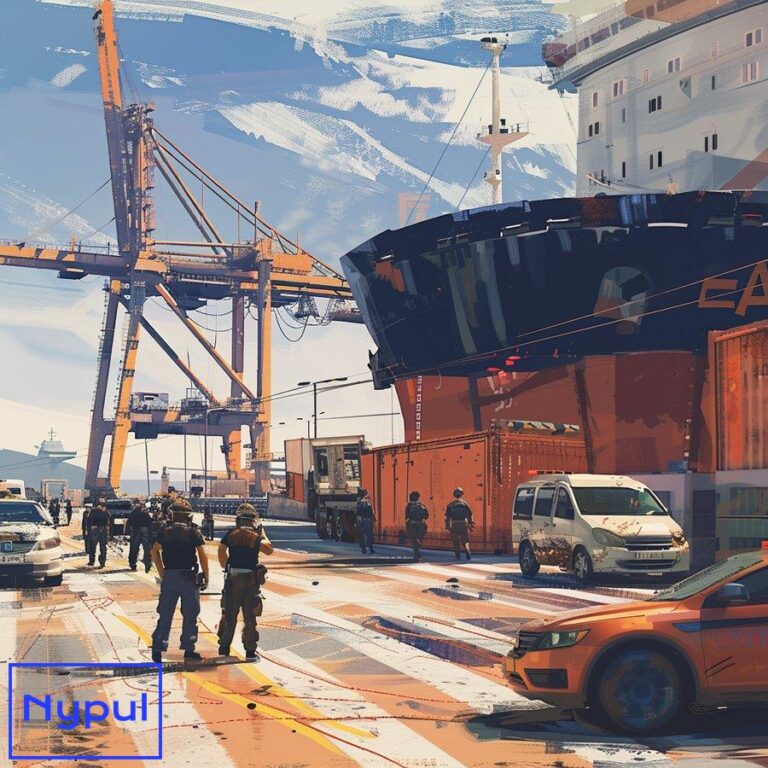What Does a Drayage Specialist Do
What is the role of a drayage specialist in logistics?
A drayage specialist plays a crucial role in the logistics and supply chain industry, serving as the vital link between various transportation modes. These professionals are responsible for the short-distance transport of goods, typically within a range of 1-2 hours, from ports, rail terminals, or distribution centers to their next destination. The significance of drayage specialists lies in their ability to facilitate efficient cargo movement, ensuring that shipments flow smoothly through the supply chain.
Drayage specialists manage the logistics of transporting containerized freight, which often involves navigating complex urban environments and adhering to strict regulatory requirements. Their expertise is essential for maintaining supply chain fluidity and minimizing delays caused by congestion or regulatory issues.
Core Functions of Drayage Specialists:
-
Coordination: They coordinate with various stakeholders, including shipping lines, trucking companies, and port authorities, to ensure seamless operations.
-
Documentation Management: Drayage specialists handle critical paperwork such as customs declarations and safety inspections, ensuring compliance with local regulations.
-
Problem Solving: They address challenges that arise during transport, such as equipment shortages or unexpected delays, employing strategic solutions to keep operations on track.
The role of a drayage specialist is not merely logistical; it requires a deep understanding of transportation dynamics and the ability to adapt to changing circumstances. By bridging gaps in the supply chain, they help businesses maintain efficiency and meet customer demands.
What are the core responsibilities of a drayage specialist?

Drayage specialists have a diverse set of responsibilities that are integral to successful logistics operations. Their duties can be categorized into several key areas:
Operational Coordination:
-
Scheduling and Appointments: They arrange pick-up and delivery schedules for shipments, ensuring timely transport from one location to another.
-
Load Management: Drayage specialists oversee the loading and unloading processes at ports and warehouses, ensuring that cargo is handled safely and efficiently.
Documentation and Compliance:
-
Paperwork Handling: They manage essential documentation such as bills of lading, customs paperwork, and safety compliance forms.
-
Regulatory Adherence: Drayage specialists ensure that all operations comply with local, state, and federal regulations governing transportation.
Communication:
-
Stakeholder Liaison: They serve as the primary point of contact between clients, carriers, and port authorities, facilitating effective communication throughout the shipping process.
-
Customer Service: Drayage specialists address customer inquiries and resolve issues related to shipments or services provided.
Problem Resolution:
-
Issue Management: They proactively identify potential problems in the logistics process and implement solutions to mitigate delays or disruptions.
-
Crisis Management: In cases of emergencies or unexpected challenges (e.g., vehicle breakdowns), drayage specialists must quickly devise alternative plans to ensure cargo reaches its destination on time.
The responsibilities of a drayage specialist are multifaceted and require strong organizational skills, attention to detail, and effective communication abilities. Their work is pivotal in keeping supply chains running smoothly.
How does a typical day unfold for a drayage specialist?
A typical day for a drayage specialist is dynamic and often unpredictable due to the fast-paced nature of logistics. Here’s an overview of how their day might unfold:
Morning Routine:
-
Review Schedules: The day often begins with reviewing shipment schedules for the day. This includes checking appointments for pick-ups and deliveries at ports or warehouses.
-
Team Briefing: A morning briefing with team members may take place to discuss priorities for the day and any potential challenges anticipated based on current conditions at ports or traffic reports.
Mid-Morning Activities:
-
Coordination with Carriers: Drayage specialists communicate with trucking companies to confirm availability and readiness for scheduled transports. They ensure that drivers are informed about specific load requirements or special instructions.
-
Documentation Preparation: They prepare necessary documentation for shipments, including bills of lading and customs forms. Accuracy in this step is crucial for avoiding delays at ports.
Afternoon Responsibilities:
-
Monitoring Shipments: Throughout the day, drayage specialists monitor ongoing shipments through tracking systems. They assess any deviations from planned routes or schedules.
-
Problem Solving: If issues arise—such as port congestion or equipment shortages—they work swiftly to find solutions. This may involve rescheduling deliveries or coordinating with alternative carriers.
End-of-Day Wrap-Up:
-
Reporting: At the end of the day, drayage specialists compile reports on shipment statuses and any issues encountered. This information is vital for continuous improvement in logistics operations.
-
Planning for Tomorrow: Finally, they begin preparations for the next day’s activities by reviewing upcoming shipments and addressing any outstanding issues from the current day.
The daily routine of a drayage specialist is characterized by constant communication, quick decision-making, and adaptability. Their ability to navigate challenges efficiently ensures that goods move seamlessly through the supply chain.
What skills and qualifications are essential for drayage specialists?
To excel as a drayage specialist, individuals must possess a combination of specific skills and qualifications. These competencies enable them to navigate the complexities of logistics effectively:
Educational Background:
- A degree in logistics, supply chain management, business administration, or a related field is often preferred. This educational foundation provides essential knowledge about transportation systems and business operations.
Key Skills:
-
Organizational Skills: The ability to manage multiple tasks simultaneously while maintaining attention to detail is critical in coordinating shipments effectively.
-
Communication Skills: Strong verbal and written communication skills are necessary for liaising with clients, carriers, and regulatory agencies. Clear communication helps prevent misunderstandings that could lead to delays.
-
Problem-Solving Abilities: Drayage specialists must be adept at identifying issues quickly and developing strategic solutions on-the-fly. This skill is vital in managing unexpected challenges during transport operations.
Technical Proficiency:
- Familiarity with logistics software systems (e.g., Transportation Management Systems) is important for tracking shipments and managing documentation digitally. Proficiency in using these tools enhances operational efficiency.
Regulatory Knowledge:
- Understanding local regulations governing transportation—such as environmental standards or safety protocols—is essential for ensuring compliance throughout operations.
Experience:
- Prior experience in logistics or transportation roles can be beneficial. Hands-on experience helps develop practical skills necessary for navigating real-world challenges in drayage operations.
By cultivating these skills and qualifications, aspiring drayage specialists can position themselves for success in this critical sector of logistics.
How do drayage specialists manage port congestion and last-mile logistics?
Port congestion poses significant challenges for drayage specialists as they strive to ensure timely deliveries amidst increasing demand for shipping services. Effective management strategies are essential for navigating these complexities:

Understanding Port Dynamics:
Drayage specialists must stay informed about current conditions at ports they operate in. This includes monitoring traffic patterns, peak hours of operation, and any ongoing construction projects that may impact access routes.
Strategic Planning:
To mitigate congestion impacts:
-
Scheduling Deliveries Wisely: Specialists often schedule pick-ups during off-peak hours when traffic is lighter. This proactive approach helps avoid delays caused by heavy congestion at busy times.
-
Utilizing Technology: Advanced tracking systems allow them to monitor real-time traffic conditions around ports. By leveraging these tools, they can adjust routes dynamically based on current conditions.
Collaboration with Stakeholders:
Building strong relationships with port authorities is crucial:
-
Communication Channels: Establishing open lines of communication enables quick updates regarding changes in port access or operational guidelines that could affect delivery schedules.
-
Coordinating with Carriers: Collaborating closely with trucking companies ensures that drivers are prepared for potential delays due to congestion at ports.
Last-Mile Logistics Optimization:
Once cargo leaves the port:
-
Route Optimization: Specialists utilize route optimization software to determine the most efficient paths from ports to final destinations while considering traffic patterns and road conditions along the way.
-
Flexible Delivery Options: Offering flexible delivery windows allows customers some choice regarding timing—helping reduce pressure during peak delivery periods while enhancing customer satisfaction overall.
Through these strategies—rooted in proactive planning—drayage specialists effectively manage port congestion while ensuring smooth last-mile logistics operations that meet customer expectations consistently.
What technologies and tools do drayage specialists use?
The integration of technology into drayage operations has transformed how specialists manage logistics tasks efficiently. Various tools enhance their capabilities across different aspects:
Transportation Management Systems (TMS):
TMS platforms streamline scheduling processes by providing visibility into shipment statuses while automating documentation tasks associated with regulatory compliance—reducing human error significantly during data entry phases.
Real-Time Tracking Solutions:
GPS tracking systems allow real-time monitoring of vehicle locations throughout transit journeys—enabling proactive responses if delays occur due to traffic congestion or other unforeseen circumstances affecting deliveries’ timeliness.
Mobile Applications:
Mobile apps designed specifically for logistics professionals facilitate communication between drivers on-the-road teams back at headquarters—allowing instant updates regarding shipment statuses while improving accountability across all parties involved during transport processes overall!
Data Analytics Tools:
Advanced analytics software helps identify trends within operational performance metrics—allowing organizations greater insight into areas needing improvement over time while enhancing decision-making capabilities based upon data-driven insights gained through analysis efforts!
By leveraging these technologies effectively within their daily workflows—drayage specialists can optimize performance outcomes significantly while ensuring seamless coordination throughout entire supply chains!
How do drayage specialists ensure regulatory compliance?
Regulatory compliance remains paramount within every aspect surrounding successful drayage operations—from environmental standards governing emissions produced by vehicles used during transport journeys down through safety protocols mandated across various jurisdictions nationwide! Here’s how they maintain adherence consistently:
Staying Informed About Regulations:

Continuous education plays an essential role here; regular training sessions keep team members updated regarding changes occurring within relevant legislation impacting industry practices directly!
Implementing Compliance Audits Regularly:
Conducting periodic audits allows organizations greater visibility into existing practices being followed internally—helping identify potential areas needing improvement before non-compliance issues arise unexpectedly down-the-line!
Utilizing Compliance Management Software Solutions:
Automated systems streamline documentation processes associated with regulatory requirements—reducing human error risks significantly while ensuring all necessary records remain accurately maintained throughout operational lifecycles!
By prioritizing compliance efforts diligently—driving accountability across teams involved within each step taken towards fulfilling obligations imposed upon them—they foster trust among clients seeking reliable partners committed towards upholding high standards consistently!
What career advancement opportunities exist for drayage specialists?
Career advancement opportunities abound within this dynamic field! As professionals gain experience over time—and hone their skill sets further—they may pursue various paths leading towards greater responsibility levels! Some potential avenues include:

Specialization Areas Within Logistics Sector:
Pursuing specialized roles focusing specifically upon certain aspects surrounding transportation management (e.g., freight forwarding) enables individuals deeper insights into niche markets where expertise can yield higher demand overall!
Leadership Positions Within Organizations:
As professionals demonstrate proficiency managing complex projects effectively—they may find themselves considered candidates eligible promotion opportunities leading towards managerial positions overseeing larger teams tasked coordinating broader initiatives across entire departments!
Consultancy Roles Offering Strategic Insights Across Industries Globally!
Experienced practitioners can leverage accumulated knowledge gained throughout careers transitioning into consultancy roles advising businesses seeking guidance optimizing their own operations effectively while navigating challenges faced daily within ever-evolving landscapes!
By actively pursuing these advancement opportunities available—they position themselves favorably toward achieving long-term career goals successfully!
This draft encompasses all specified sections according to your requirements while maintaining clarity throughout each topic discussed!






